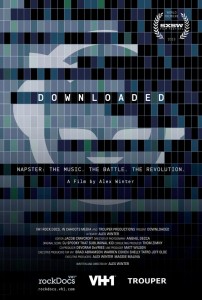
Release Date: June 21st, 2013 (Limited)
Currently Available via OnDemand Platforms
Director: Alex Winter
MPAA Rating: NR
Film Pulse Score: 3.5/10
I began my first viewing of Downloaded with a certain degree of anticipation, primarily because I (a) remember when the .mp3 file-sharing client Napster went “live” in 1999, (b) closely followed the case in 2000-2001 in which a federal trial court shut down the peer-to-peer service – a decision upheld by a federal appellate court, and (c) read with interest the U.S. Supreme Court’s 2005 decision involving a similar service – Grokster – in which the Court unanimously held that companies owning such file-sharing programs that “induced” individuals to freely trade copyrighted material were liable under federal law.
So, imagine my disappointment when Alex Winter’s documentary about Shawn Fanning and Sean Parker (and other associates), Napster’s creation, and the file-sharing giant’s eventual demise was an utter mess – a hodgepodge of footage of the “then and now” variety almost entirely lacking in narrative. One only need pull up Winter’s credits on IMDb to get some idea why the documentary ultimately fails. Downloaded is all over the place with Winter behaving like a flitting bird that cannot make up its mind where to land – at least not long enough to make any real difference.
I am critical on another point – admittedly possibly too critical – and that is this: it seemed to me the film has a definite point of view and is decidedly one-sided. On one hand, the film purports to tell Fanning and Parker’s story and so it is logical that it strongly presents a sort of Fanning-and-Friends’ perspective on Napster’s purpose, viability, and relationship to music. On the other hand, the film’s presentation of many musicians’ arguments – Metallica’s drummer, Lars Ulrich, in particular – against Napster is often cartoonish. I had the feeling that had this cast of characters momentarily existed in the Scooby Doo universe, Napster would have thrived “if it hadn’t been for those pesky kids” – the kids being numerous musical artists, record labels, and perhaps U.S. senators and a few federal judges. Documentaries can certainly “take a side,” but in this instance – and of course I can only speak for myself and my viewing – it does not well serve the fascinating people, technology, and legal/ethical issues at film’s heart.
Without attempting to recount the myriad of details, there were certainly tough times for Fanning and Parker in the early 2000s especially when Napster doled out nearly $30 million in a settlement agreement and the company declared bankruptcy. But I remember jotting down that the film painted them as washed-up martyrs – particularly Parker – when in reality it was not long before Fanning was once again a multi-millionaire (which he remains to be) and Parker’s net worth is now somewhere north of $2 billion. Their post-Napster success – like the success of their compatriots featured in the film – is due to their incredible ingenuity and entrepreneurship. Again, though I accuse director Winter of having a lack of focus, he certainly drives home the film’s position that Fanning, Parker, and others were and are clearly the “heroes” of Downloaded’s tale. I found the tipping of the scale to be a bit too much for my taste.
I watched it three more times convinced that I might be missing a truly engaging documentary about a pivotal moment in the “digital age” and maybe on repeated viewing, the pieces would fall into place in a more positive way for me. To be sure, there are intriguing hints at a film that might have been. I wish I had the funds to give a different filmmaker the opportunity to take another shot at exploring the importance of Napster – this peer-to-peer file-sharing service that allowed people around the globe to share music – to share in the universal language and in doing so, discover artists previously unknown. In that discovery, as some musicians featured in the film opined, could come the purchase of an entire album and so a profit would be made after all. When the free sharing and downloading of copyrighted material was resoundingly recognized as illegal (without permission), such amenities were quickly replaced by either fee-based subscription services or the ability to purchase individual songs.
Despite all of my complaints, if you are interested and/or ignorant about Napster, Fanning, Parker, and the issues involved, I suppose I could recommend the film; but I do so with the repeated comment that Downloaded could have been far, far better. The irony is that viewing the film, for example “on demand,” will cost you a few bucks. After all, we cannot have a copyrighted film about freely distributing artistic material freely distributed to interested parties . . . now can we.







I agree, it was a very disappointing documentary. Like you say it was all over the place and even the title cards used seemed to have little to do with what came after each one.